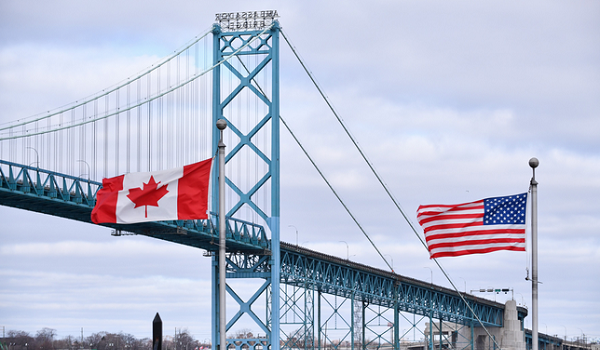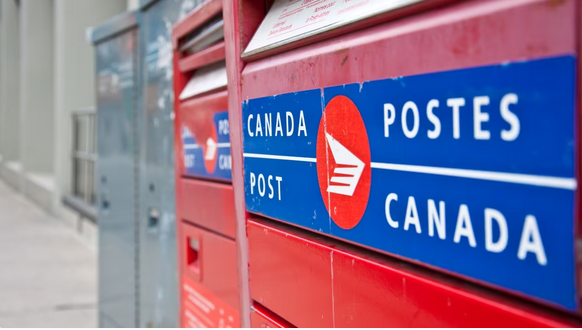Residents of Canada-US border states disagree over proposals for a wall, amid a jump in illegal crossings
Around the bar at Wayne’s Lanes, a bowling alley in the Vermont village of Canaan, the rumours of people clandestinely slipping across the nearby border from Canada come out in a trickle.
There was the couple spotted walking down a remote road last October, clad in floral shirts and shorts as if they had no idea what to expect from the chill of a New England autumn. The four figures, carrying backpacks, seen crossing a farm field. Others trekking through the forest or waiting by the side of the highway.
No one can be certain that these sightings were of unauthorized migrants. But with a jump in illegal border crossings in the area, some here have taken notice of anything that seems out of place.
“People are coming in droves. We hope somebody gets a handle on it before it’s too late,” says Robert Kimball, the bar’s 66-year-old owner, who has decorated his wood-panelled establishment with Donald Trump campaign stickers.
The number of apprehensions in the border sector that includes Vermont, New Hampshire and part of New York state rose to 6,925 last year from 1,065 the year before, according to figures from U.S. Customs and Border Protection. About half of these were Mexican nationals, with significant proportions from India and Venezuela as well.
The totals are still modest compared to those on the U.S. border with Mexico. The entire frontier with Canada saw fewer than 200,000 apprehensions last year, a little more than 6 per cent of the 3.2 million nationwide total.
But the increase has prompted Republican presidential candidate Nikki Haley to argue for building a wall on at least part of the Canada-U.S. border. Before quitting the race this month, Vivek Ramaswamy and Ron DeSantis also endorsed such a policy. New Hampshire Governor Chris Sununu announced a tenfold increase of state trooper patrols in the area.
Even Mr. Kimball isn’t sold on such a clampdown. The two countries’ economic and social ties are particularly evident in places such as this. Mr. Kimball himself regularly makes the half-hour drive to Coaticook, Que., to play bingo. His Canadian friends come to Canaan to bowl.
“I go across to Canada every day, and I enjoy going up there,” he says. “A wall isn’t even an option. Canada is our prime partner. I’d hate to see the border close.”
In the Canaan area, where villages of clapboard houses sit nestled amid rugged, forested hills, people say the illegal crossings haven’t really been a problem. The heavy-handed proposed solutions, meanwhile, are often met with laughter.
Sarah Kirk, who owns a bar named Border Jumpers in the hamlet of Beecher Falls, Vt., says she hears stories about migrant crossings from friends who work for border patrol. So far, she hasn’t seen any herself. Given the state of the labour market in this remote, rural place, she wouldn’t be opposed to granting them legal status.
“They’re not stopping here and spending their money,” Ms. Kirk, 49, quips. “Maybe if we gave these immigrants asylum, they could come apply for a job with me.”
Her bar sits less than a kilometre from the point where Vermont, New Hampshire and Quebec meet and, as attested by its name, serves a clientele used to moving between the jurisdictions. The snowmobile paths that provide the area’s prime source of winter recreation sometimes even cross the international border.
“That’s what we do here, we jump borders. All day long, border to border to border,” she says.
Appropriately for a place closer to Sherbrooke than to any American city, the northern portion of New Hampshire was once even disputed between the U.S. and Canada, then a British colony. To avoid being taxed by both countries, about 300 residents founded the independent Indian Stream Republic in 1832. The Webster-Ashburton Treaty of 1842 ultimately fixed the border in its current location.
Along the highway that now bisects the former republic, some people express bemusement upon learning there has been an increase in unauthorized border crossings in the area.
“Really?” says Jay Wagner, 41, who runs Grampy’s Drive-In in Pittsburg, N.H. “Going which way?”
Mr. Wagner has seen video of the migrants crossing from the U.S. to Canada via Roxham Road before the tightening of the Safe Third Country Agreement last year. He hasn’t heard anything about people moving in the opposite direction.
On ATV rides through the woods, he says the only people he’s seen are fellow recreationalists and border patrol officers. “There’s a ton of border patrol. They’re up here all over the place,” he says. “I’ve never seen anybody illegally crossing. I don’t even think it’s a real issue.”
Chris Stevens, 49, dismisses any notion of a problem at the northern frontier as “political hoo-ha” as he serves groups of snowmobilers at the Full Send bar and grill. “It’s border politics and they use it to wedge people. It’s a classic playbook.”
At Wayne’s Lanes, where locals have gathered on a snowy, sub-zero weekday, John Sweeny has a similarly sanguine attitude. “It’s a tough situation but what are you going to do? It’s part of being one of the best countries in the world,” the 57-year-old says of migration. He smirks at the mention of a border wall: “How are they going to put a fence over Niagara Falls?”
Adds his friend, Craig Martin, 65: “As soon as Trump gets Mexico to pay for the first one, I’ll vote for him.”
Patti Craig, a 64-year-old retired farmer, knows the apprehension numbers off the top of her head and supports closing the Mexican border. She doesn’t think the same action is warranted here. “It’s horrible, but we’ve never had the problem that the southern border does.”
To Bob McComiskey, none of this is anything new. From time to time over the years, he’s seen people he believes crossed the border illegally, walking down a road near his land.
When he hears anti-immigrant comments from his neighbours, he chalks it up to what they’re seeing on TV from other parts of the country. Around here, he says, such fears are groundless.
“There has never been any trouble. These are just people trying to make a better life,” says Mr. McComiskey, 68, who owns a restaurant called the Hobo Café in a nearby village. “You’ve got to be Christian about the whole dang thing. You can’t be political.”
This article was reported by The Globe and Mail












